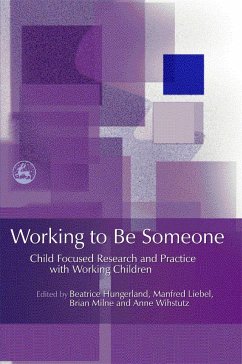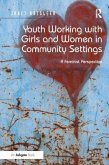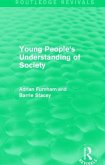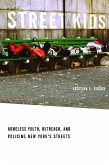Working to Be Someone
Child Focused Research and Practice with Working Children
Herausgeber: Hungerland, Beatrice; Wihstutz, Anne; Milne, Brian; Liebel, Manfred
Schade – dieser Artikel ist leider ausverkauft. Sobald wir wissen, ob und wann der Artikel wieder verfügbar ist, informieren wir Sie an dieser Stelle.
Working to Be Someone
Child Focused Research and Practice with Working Children
Herausgeber: Hungerland, Beatrice; Wihstutz, Anne; Milne, Brian; Liebel, Manfred
- Broschiertes Buch
- Merkliste
- Auf die Merkliste
- Bewerten Bewerten
- Teilen
- Produkt teilen
- Produkterinnerung
- Produkterinnerung
This book presents an overview of worldwide research on working children that considers children's own views of employment in favour of adult-constructed arguments about child work. This is a key text for social work practitioners that encourages re-evaluation of the notion of childhood and understands the complex phenomenon of working children.
Andere Kunden interessierten sich auch für
![Youth Working with Girls and Women in Community Settings Youth Working with Girls and Women in Community Settings]() Janet BatsleerYouth Working with Girls and Women in Community Settings86,99 €
Janet BatsleerYouth Working with Girls and Women in Community Settings86,99 €![Young People's Understanding of Society (Routledge Revivals) Young People's Understanding of Society (Routledge Revivals)]() Adrian FurnhamYoung People's Understanding of Society (Routledge Revivals)50,99 €
Adrian FurnhamYoung People's Understanding of Society (Routledge Revivals)50,99 €![Youth Crime and Youth Culture in the Inner City Youth Crime and Youth Culture in the Inner City]() Bill SandersYouth Crime and Youth Culture in the Inner City74,99 €
Bill SandersYouth Crime and Youth Culture in the Inner City74,99 €![The Emotional Experience of Adoption The Emotional Experience of Adoption]() Debbie Hindle / Graham Shulman (eds.)The Emotional Experience of Adoption67,99 €
Debbie Hindle / Graham Shulman (eds.)The Emotional Experience of Adoption67,99 €![When Are You Coming Home? When Are You Coming Home?]() Hilary CuthrellWhen Are You Coming Home?40,99 €
Hilary CuthrellWhen Are You Coming Home?40,99 €![Street Kids Street Kids]() Kristina E GibsonStreet Kids38,99 €
Kristina E GibsonStreet Kids38,99 €
This book presents an overview of worldwide research on working children that considers children's own views of employment in favour of adult-constructed arguments about child work. This is a key text for social work practitioners that encourages re-evaluation of the notion of childhood and understands the complex phenomenon of working children.
Produktdetails
- Produktdetails
- Verlag: Jessica Kingsley Publishers
- Seitenzahl: 272
- Erscheinungstermin: 15. Februar 2007
- Englisch
- Abmessung: 232mm x 161mm x 17mm
- Gewicht: 413g
- ISBN-13: 9781843105237
- ISBN-10: 1843105233
- Artikelnr.: 21940288
- Herstellerkennzeichnung
- Libri GmbH
- Europaallee 1
- 36244 Bad Hersfeld
- gpsr@libri.de
- Verlag: Jessica Kingsley Publishers
- Seitenzahl: 272
- Erscheinungstermin: 15. Februar 2007
- Englisch
- Abmessung: 232mm x 161mm x 17mm
- Gewicht: 413g
- ISBN-13: 9781843105237
- ISBN-10: 1843105233
- Artikelnr.: 21940288
- Herstellerkennzeichnung
- Libri GmbH
- Europaallee 1
- 36244 Bad Hersfeld
- gpsr@libri.de
Beatrice Hungerland is Professor of Childhood Studies at the University of Applied Sciences, Magdeburg-Stendal, and a member of ProNats Berlin, an initiative supporting the working children and youth's worldwide movement. Manfred Liebel is Professor Emeritus of Sociology at the Technical University of Berlin. He is a consultant and lecturer on working children and youth movements in Latin America and Africa, and he co-edits NATs: Working Children and Adolescents International Review. Brian Milne is a consultant researcher and trainer in children's rights. He has done research, evaluation and training in fields of child protection, originally specializing in the fields of street and working children. Anne Wihstutz has a PhD in education and sociology of children, is a scientific assistant, and lecturer at Martin-Luther-University of Halle-Wittenberg. Her areas of research include working children, domestic work and care by children, and social work.
Introduction. Beatrice Hungerland, Manfred Liebel, Brian Milne and Anne
Wihstutz. Part 1. Theoretical Approaches. 1. A Feminist Economist's
Approach to Children's Work. Deborah Levison, University of Minnesota, MN.
2. Working Children and the Cultural Perception of Childhood. Zandra
Pedraza-Gómez, Universidad de los Andes, Colombia. 3. Harmed by Work or
Developing Through Work?: Issues in the Study of Psychosocial Impacts.
Martin Woodhead, Open University. 4. The Reintegration of Children into the
Adult World of Work: Ominous Sign or Cause for Optimism? Dieter Kirchhöfer,
University of Potsdam, Germany. Part 2. Care and Domestic Work. 5. Child
Domestic Workers in Zimbabwe. Michael Bourdillon, University of Zimbabwe,
Harare. 6. Negotiating Gender Identities: Domestic Work of Indian Children
in Britain and in India. Vinod Chandra, Indian Institute of Technology,
Khargpur. 7. The Significance of Care and Domestic Work to Children: A
Germany Portray. Anne Wihstutz, Martin-Luther University, Germany. 8.
`Helping at Home': The Concept of Childhood and Work Among the Nahuas of
Tlaxcala Mexico. Martha Areli Ramírez Sánchez, Universidad Iberoamericana,
Mexico City. Part 3. Work and Competence. 9. Children's Work as Preparation
for Adulthood: A British Perspective. Jim McKechnie and Sandy Hobbs,
University of Paisley. 10. Working Children in Fez, Morocco: Relationship
Between Knowledge and Strategies for Social and Professional Integration.
Bernard Schlemmer, Institute de Recherche pour le Développement, France.11.
Working and Growing Up in America: Myths and Realities. Jeylan T. Mortimer,
University of Minnesota, MN. 12. Between Prohibition and Praise: Some
Hidden Aspects of Children's Work in Affluent Societies. Manfred Liebel,
Technical University of Berlin, Germany. Part 4. Participation of Working
Children. 13. Children's Work as `Participation': Thoughts on Ethnographic
Data in Lima and the Algarve. Antonella Invernizzi, Swansea University,.
14. Child Employment in Northern Ireland: Myths and Realities. Madeleine
Leonard, Queens University. 15. Vocabularies, Motives and Meanings -
School-Age Workers in Britain: Towards a Synthesis? Christopher Pole,
University of Leicester. 16. Child Work and Child Labour in Italy: The
Point of View of the Children. Maria Teresa Tagliaventi, Istituto degli
Innocenti, Italy.17. Work - A Way to Participative Autonomy for Children.
Beatrice Hungerland, University of Applied Sciences, Magdeburg-Stendal,
Germany. Part 5. Citizenship and Working Children's Movements and
Organisations. 18. The Stakes of Children's Participation in Africa: The
African Movement of Working Children and Youth. Hamidou Coly, street worker
and collaborator of the African Movement of Working Children and Fabrizio
Terenzio, Youth Action Team, ENDA, Senegal. 19. Working With Working
Children in India. Nandana Reddy, Concerned for Working Children, India.
20. Dialogue and Empowerment for Change: The Influence of Organisations of
Working Children in Southeast Asia on the Social Status of Working
Children. Dominique Pierre Plateau, Save the Children, Sweden. 21. Do the
Participation Articles in the Convention on the Rights of the Child Present
Us with a Recipe for Children's Citizenship? Brian Milne, Consultant
Researcher and Trainer in Children's Rights, Swansea. Part 6. Challenges
and Perspectives for Research and Policy. 22. Challenges for Social
Research and Action with Working Children. Virginia Morrow, University of
London. 23. Some Suggestions for Social Research on Working Children's
Initiatives. William E. Myers, University of California, CA. 24. The
Balance Model Reconsidered: Changing Perceptions of Child Employment. Sandy
Hobbs and Jim McKechnie.25. Exploring Children's Work Through Pictures.
Phil Mizen, University of Warwick.Bibliography. The Contributors. Subject
index. Author index.
Wihstutz. Part 1. Theoretical Approaches. 1. A Feminist Economist's
Approach to Children's Work. Deborah Levison, University of Minnesota, MN.
2. Working Children and the Cultural Perception of Childhood. Zandra
Pedraza-Gómez, Universidad de los Andes, Colombia. 3. Harmed by Work or
Developing Through Work?: Issues in the Study of Psychosocial Impacts.
Martin Woodhead, Open University. 4. The Reintegration of Children into the
Adult World of Work: Ominous Sign or Cause for Optimism? Dieter Kirchhöfer,
University of Potsdam, Germany. Part 2. Care and Domestic Work. 5. Child
Domestic Workers in Zimbabwe. Michael Bourdillon, University of Zimbabwe,
Harare. 6. Negotiating Gender Identities: Domestic Work of Indian Children
in Britain and in India. Vinod Chandra, Indian Institute of Technology,
Khargpur. 7. The Significance of Care and Domestic Work to Children: A
Germany Portray. Anne Wihstutz, Martin-Luther University, Germany. 8.
`Helping at Home': The Concept of Childhood and Work Among the Nahuas of
Tlaxcala Mexico. Martha Areli Ramírez Sánchez, Universidad Iberoamericana,
Mexico City. Part 3. Work and Competence. 9. Children's Work as Preparation
for Adulthood: A British Perspective. Jim McKechnie and Sandy Hobbs,
University of Paisley. 10. Working Children in Fez, Morocco: Relationship
Between Knowledge and Strategies for Social and Professional Integration.
Bernard Schlemmer, Institute de Recherche pour le Développement, France.11.
Working and Growing Up in America: Myths and Realities. Jeylan T. Mortimer,
University of Minnesota, MN. 12. Between Prohibition and Praise: Some
Hidden Aspects of Children's Work in Affluent Societies. Manfred Liebel,
Technical University of Berlin, Germany. Part 4. Participation of Working
Children. 13. Children's Work as `Participation': Thoughts on Ethnographic
Data in Lima and the Algarve. Antonella Invernizzi, Swansea University,.
14. Child Employment in Northern Ireland: Myths and Realities. Madeleine
Leonard, Queens University. 15. Vocabularies, Motives and Meanings -
School-Age Workers in Britain: Towards a Synthesis? Christopher Pole,
University of Leicester. 16. Child Work and Child Labour in Italy: The
Point of View of the Children. Maria Teresa Tagliaventi, Istituto degli
Innocenti, Italy.17. Work - A Way to Participative Autonomy for Children.
Beatrice Hungerland, University of Applied Sciences, Magdeburg-Stendal,
Germany. Part 5. Citizenship and Working Children's Movements and
Organisations. 18. The Stakes of Children's Participation in Africa: The
African Movement of Working Children and Youth. Hamidou Coly, street worker
and collaborator of the African Movement of Working Children and Fabrizio
Terenzio, Youth Action Team, ENDA, Senegal. 19. Working With Working
Children in India. Nandana Reddy, Concerned for Working Children, India.
20. Dialogue and Empowerment for Change: The Influence of Organisations of
Working Children in Southeast Asia on the Social Status of Working
Children. Dominique Pierre Plateau, Save the Children, Sweden. 21. Do the
Participation Articles in the Convention on the Rights of the Child Present
Us with a Recipe for Children's Citizenship? Brian Milne, Consultant
Researcher and Trainer in Children's Rights, Swansea. Part 6. Challenges
and Perspectives for Research and Policy. 22. Challenges for Social
Research and Action with Working Children. Virginia Morrow, University of
London. 23. Some Suggestions for Social Research on Working Children's
Initiatives. William E. Myers, University of California, CA. 24. The
Balance Model Reconsidered: Changing Perceptions of Child Employment. Sandy
Hobbs and Jim McKechnie.25. Exploring Children's Work Through Pictures.
Phil Mizen, University of Warwick.Bibliography. The Contributors. Subject
index. Author index.
Introduction. Beatrice Hungerland, Manfred Liebel, Brian Milne and Anne
Wihstutz. Part 1. Theoretical Approaches. 1. A Feminist Economist's
Approach to Children's Work. Deborah Levison, University of Minnesota, MN.
2. Working Children and the Cultural Perception of Childhood. Zandra
Pedraza-Gómez, Universidad de los Andes, Colombia. 3. Harmed by Work or
Developing Through Work?: Issues in the Study of Psychosocial Impacts.
Martin Woodhead, Open University. 4. The Reintegration of Children into the
Adult World of Work: Ominous Sign or Cause for Optimism? Dieter Kirchhöfer,
University of Potsdam, Germany. Part 2. Care and Domestic Work. 5. Child
Domestic Workers in Zimbabwe. Michael Bourdillon, University of Zimbabwe,
Harare. 6. Negotiating Gender Identities: Domestic Work of Indian Children
in Britain and in India. Vinod Chandra, Indian Institute of Technology,
Khargpur. 7. The Significance of Care and Domestic Work to Children: A
Germany Portray. Anne Wihstutz, Martin-Luther University, Germany. 8.
`Helping at Home': The Concept of Childhood and Work Among the Nahuas of
Tlaxcala Mexico. Martha Areli Ramírez Sánchez, Universidad Iberoamericana,
Mexico City. Part 3. Work and Competence. 9. Children's Work as Preparation
for Adulthood: A British Perspective. Jim McKechnie and Sandy Hobbs,
University of Paisley. 10. Working Children in Fez, Morocco: Relationship
Between Knowledge and Strategies for Social and Professional Integration.
Bernard Schlemmer, Institute de Recherche pour le Développement, France.11.
Working and Growing Up in America: Myths and Realities. Jeylan T. Mortimer,
University of Minnesota, MN. 12. Between Prohibition and Praise: Some
Hidden Aspects of Children's Work in Affluent Societies. Manfred Liebel,
Technical University of Berlin, Germany. Part 4. Participation of Working
Children. 13. Children's Work as `Participation': Thoughts on Ethnographic
Data in Lima and the Algarve. Antonella Invernizzi, Swansea University,.
14. Child Employment in Northern Ireland: Myths and Realities. Madeleine
Leonard, Queens University. 15. Vocabularies, Motives and Meanings -
School-Age Workers in Britain: Towards a Synthesis? Christopher Pole,
University of Leicester. 16. Child Work and Child Labour in Italy: The
Point of View of the Children. Maria Teresa Tagliaventi, Istituto degli
Innocenti, Italy.17. Work - A Way to Participative Autonomy for Children.
Beatrice Hungerland, University of Applied Sciences, Magdeburg-Stendal,
Germany. Part 5. Citizenship and Working Children's Movements and
Organisations. 18. The Stakes of Children's Participation in Africa: The
African Movement of Working Children and Youth. Hamidou Coly, street worker
and collaborator of the African Movement of Working Children and Fabrizio
Terenzio, Youth Action Team, ENDA, Senegal. 19. Working With Working
Children in India. Nandana Reddy, Concerned for Working Children, India.
20. Dialogue and Empowerment for Change: The Influence of Organisations of
Working Children in Southeast Asia on the Social Status of Working
Children. Dominique Pierre Plateau, Save the Children, Sweden. 21. Do the
Participation Articles in the Convention on the Rights of the Child Present
Us with a Recipe for Children's Citizenship? Brian Milne, Consultant
Researcher and Trainer in Children's Rights, Swansea. Part 6. Challenges
and Perspectives for Research and Policy. 22. Challenges for Social
Research and Action with Working Children. Virginia Morrow, University of
London. 23. Some Suggestions for Social Research on Working Children's
Initiatives. William E. Myers, University of California, CA. 24. The
Balance Model Reconsidered: Changing Perceptions of Child Employment. Sandy
Hobbs and Jim McKechnie.25. Exploring Children's Work Through Pictures.
Phil Mizen, University of Warwick.Bibliography. The Contributors. Subject
index. Author index.
Wihstutz. Part 1. Theoretical Approaches. 1. A Feminist Economist's
Approach to Children's Work. Deborah Levison, University of Minnesota, MN.
2. Working Children and the Cultural Perception of Childhood. Zandra
Pedraza-Gómez, Universidad de los Andes, Colombia. 3. Harmed by Work or
Developing Through Work?: Issues in the Study of Psychosocial Impacts.
Martin Woodhead, Open University. 4. The Reintegration of Children into the
Adult World of Work: Ominous Sign or Cause for Optimism? Dieter Kirchhöfer,
University of Potsdam, Germany. Part 2. Care and Domestic Work. 5. Child
Domestic Workers in Zimbabwe. Michael Bourdillon, University of Zimbabwe,
Harare. 6. Negotiating Gender Identities: Domestic Work of Indian Children
in Britain and in India. Vinod Chandra, Indian Institute of Technology,
Khargpur. 7. The Significance of Care and Domestic Work to Children: A
Germany Portray. Anne Wihstutz, Martin-Luther University, Germany. 8.
`Helping at Home': The Concept of Childhood and Work Among the Nahuas of
Tlaxcala Mexico. Martha Areli Ramírez Sánchez, Universidad Iberoamericana,
Mexico City. Part 3. Work and Competence. 9. Children's Work as Preparation
for Adulthood: A British Perspective. Jim McKechnie and Sandy Hobbs,
University of Paisley. 10. Working Children in Fez, Morocco: Relationship
Between Knowledge and Strategies for Social and Professional Integration.
Bernard Schlemmer, Institute de Recherche pour le Développement, France.11.
Working and Growing Up in America: Myths and Realities. Jeylan T. Mortimer,
University of Minnesota, MN. 12. Between Prohibition and Praise: Some
Hidden Aspects of Children's Work in Affluent Societies. Manfred Liebel,
Technical University of Berlin, Germany. Part 4. Participation of Working
Children. 13. Children's Work as `Participation': Thoughts on Ethnographic
Data in Lima and the Algarve. Antonella Invernizzi, Swansea University,.
14. Child Employment in Northern Ireland: Myths and Realities. Madeleine
Leonard, Queens University. 15. Vocabularies, Motives and Meanings -
School-Age Workers in Britain: Towards a Synthesis? Christopher Pole,
University of Leicester. 16. Child Work and Child Labour in Italy: The
Point of View of the Children. Maria Teresa Tagliaventi, Istituto degli
Innocenti, Italy.17. Work - A Way to Participative Autonomy for Children.
Beatrice Hungerland, University of Applied Sciences, Magdeburg-Stendal,
Germany. Part 5. Citizenship and Working Children's Movements and
Organisations. 18. The Stakes of Children's Participation in Africa: The
African Movement of Working Children and Youth. Hamidou Coly, street worker
and collaborator of the African Movement of Working Children and Fabrizio
Terenzio, Youth Action Team, ENDA, Senegal. 19. Working With Working
Children in India. Nandana Reddy, Concerned for Working Children, India.
20. Dialogue and Empowerment for Change: The Influence of Organisations of
Working Children in Southeast Asia on the Social Status of Working
Children. Dominique Pierre Plateau, Save the Children, Sweden. 21. Do the
Participation Articles in the Convention on the Rights of the Child Present
Us with a Recipe for Children's Citizenship? Brian Milne, Consultant
Researcher and Trainer in Children's Rights, Swansea. Part 6. Challenges
and Perspectives for Research and Policy. 22. Challenges for Social
Research and Action with Working Children. Virginia Morrow, University of
London. 23. Some Suggestions for Social Research on Working Children's
Initiatives. William E. Myers, University of California, CA. 24. The
Balance Model Reconsidered: Changing Perceptions of Child Employment. Sandy
Hobbs and Jim McKechnie.25. Exploring Children's Work Through Pictures.
Phil Mizen, University of Warwick.Bibliography. The Contributors. Subject
index. Author index.







